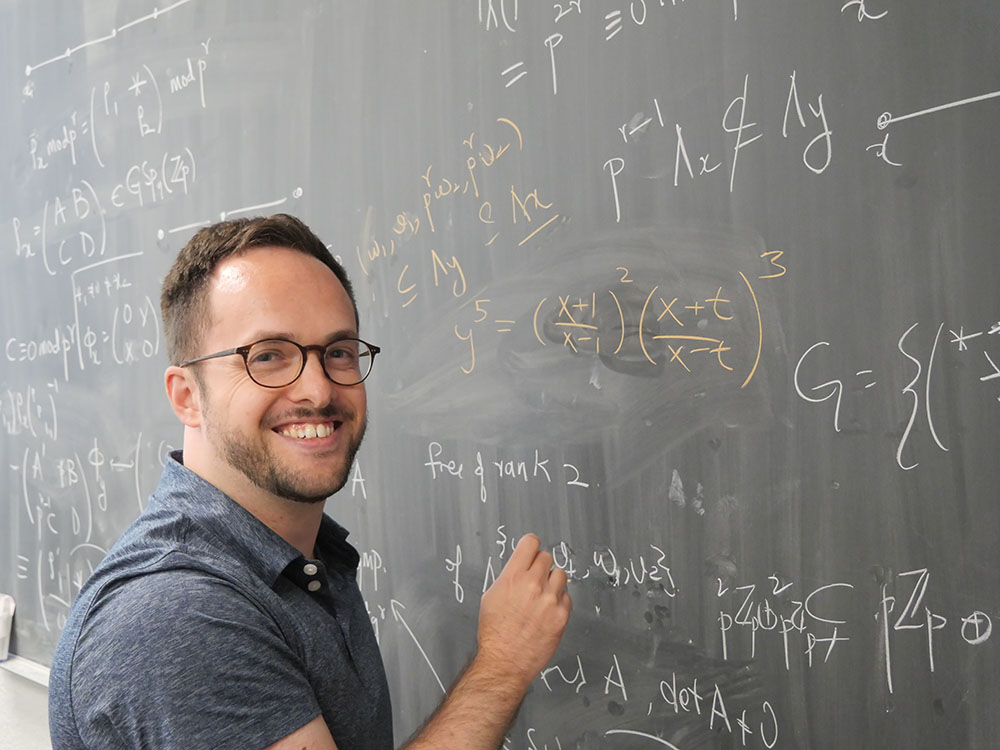Ari Shnidman, associate professor, joined the Mathematics Department in summer 2025. He earned his doctorate in mathematics at the University of Michigan and then was a postdoc at Boston College for three years.
Shnidman’s interests include arithmetic statistics, rational points on curves and abelian varieties, special values of L-functions and algebraic cycles. Before joining Temple, he was a senior lecturer and then an associate professor at Hebrew University of Jerusalem
At the heart of your research, what is the BIG question you are trying to answer?
Which polynomial equations f(x,y) = 0 have solutions with rational number coordinates? How many solutions do these equations tend to have? How do we find them? Do these solutions come from simple geometric constructions or are they just “random”?
One example is the equation x3 + y3 = n (where n is a fixed whole number). The conjecture is that if you choose n at random, then this equation has a solution exactly 50% of the time (a coin toss!), but no one knows how to prove this.
How do you go about trying to find those answers?
Generally speaking, I use tools from both geometry and algebra. When trying to prove statements about large (often infinite) collections of equations, I sometimes start by experimenting on the computer with thousands of examples, to find a pattern. Then I try to prove that the pattern always holds.
What unique methodologies or approaches do you bring to your research, and how do they set you apart in your field?
I like to bridge together different parts of math/number theory. Number theory has many subfields such as rational points on curves, statistics of number fields and class groups, and L-functions (generalizations of the famous Riemann Zeta function). Understanding the connections and parallels between areas leads to new insights.
What recent breakthrough or discovery in your field has inspired or influenced your own research agenda?
One cool new tool is the LMFDB, a large collaborative database that records tons of data and examples of number-theoretic interest. One can now study interesting phenomena (or find new phenomena) simply by navigating through tons of data in the blink of an eye. The key thing is knowing what questions to ask and finding clever ways to probe the data.
How do you plan to involve students in your research projects, and what opportunities will you offer for their active participation?
Students need to learn a lot of background to get to cutting edge of research in number theory. The good thing is that you can learn the background and start exploring interesting open questions at the same time, especially if you are willing to code a little. I like to give students an initial computational project as a way of making the abstract objects of number theory feel more concrete.
Are there specific faculty collaborations or interdisciplinary projects you're excited to explore here at CST?
I’m excited to work with Jackie Lang, another number theorist in the department. I’d also like to branch out to other areas such as topology, geometry, and computer science.
How do you plan to engage with the local community or industry partners to apply your research findings in real-world contexts?
My work is mostly theoretical so I expect my main impact in the local community will be through teaching and mentoring, as well as getting young kids excited about math. Exploring math helps you learn how to think clearly and analytically, and it’s fun and awe-inspiring when done right.
In what ways do you hope your research will contribute to society at large?
I love mathematics that explores or reveals unexpected and recurring symmetries. I find it beautiful and elegant, and it tends to help us understand the world around us. I hope that my research helps inspire other people to find their own patterns, beauty, and understanding. If eventually it leads to concrete applications in science or engineering, that’s great.
Can you share the journey that brought you to Temple University, and what aspects of the university's culture and mission attracted you to join our community?
As someone who grew up in New York City, I’m excited to be teaching and doing research in a thriving and dynamic city. Education and the pursuit of knowledge is just one part of life; it should be integrated with the rest, not isolated in its ivory tower.
What inspired or motivated you to pursue a career in science?
My parents are both scientists, so the path was a natural one, I suppose. But I’ve always been fascinated specifically by patterns in numbers and arithmetic, for some reason. My parents encouraged me to study more practical things, but I always came back to the elegance and beauty of mathematics. I’ve had many inspirational teachers and mentors along the way.
In a profession full of serious academic research, what's one quirky or offbeat topic that you're particularly passionate about?
I used to play a lot of sports, especially soccer. These days, I’m more of a spectator: big USMNT and Jets fan (though the Eagles and Owls are growing on me). My wife and I enjoy playing, singing, and listening to all kinds of music.

